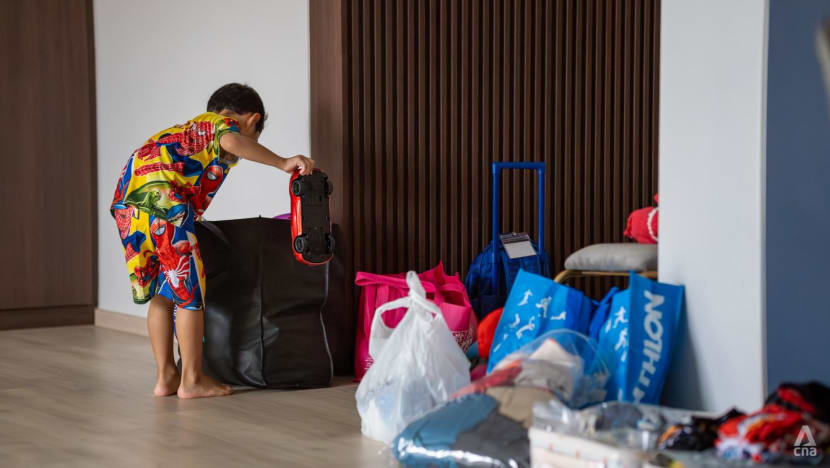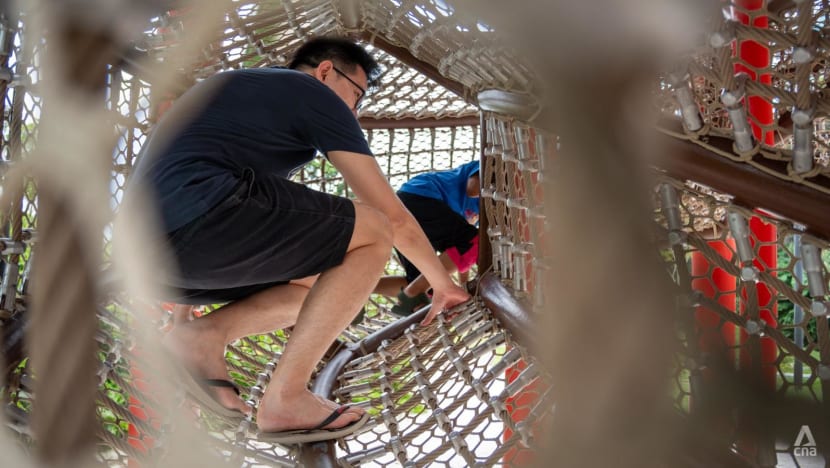A 5-year-old moves in with new foster parents. This is what happens in the first month
CNA Insider gets a rare glimpse into the chaos and joy of welcoming a foster child into one’s home for the first time. A whirlwind moving-in day marks this couple’s first steps on their journey as new foster parents.

First-time foster parents Natalie Ong and Matthew Chia welcoming *Isaac to their home. (Photos: CNA/Liew Zhi Xin)

This audio is generated by an AI tool.
*Name has been changed.
SINGAPORE: With a clatter and a thud, five-year-old *Isaac plopped down at his new foster parents’ doorstep and started strapping on an elbow pad.
“I want to go rollerblading!” he announced.
His enthusiasm left Natalie Ong, 34, and Matthew Chia, 37, both charmed and confounded. Having braced themselves for tears or shyness, the couple knelt to help him into his well-worn gear instead, surrounded by bags of clothes and toys.
Moments later, he yanked it all off. “No, I’ll go cycling!” he declared, clambering onto his bicycle.
As he darted towards the lift, his foster parents quickly brought his bags inside their house and grabbed a water bottle on the way out. Ong and Chia exchanged amused glances — the home tour would have to wait.

It was not quite the start the couple had expected, but as Isaac’s chatter filled the air, they felt the first stirrings of something unmistakeable: a sense of family.
Speaking to CNA Insider a month later, the couple said they felt inspired by their affection for children to get into fostering.
Ong, a special needs teacher, has enjoyed working with children and also has “a soft spot for those in need”. She had the idea of fostering after coming across news stories on it.
Under Singapore’s foster care system, children are temporarily placed in foster families when their birth parents cannot provide a safe home environment owing to abuse, neglect or abandonment.

Fostering provides these children with a secure family environment, with the aim of returning them to their birth families eventually, once the latter are assessed as safe to resume care for them.
Foster care applicants undergo suitability assessments, which include interview sessions, home visits, medical screening and reference checks. After approval, foster parents need to attend foundational and intermediate training courses to equip themselves with skills for supporting their foster child.
As to Ong and Chia’s approach to fostering? That would be to take things one step at a time.
“There’s a first for everything, so we didn’t know what to expect,” said Chia, who is a civil servant. “For the first night together, we’ve heard stories of kids who can’t sleep or (who) start crying and vomiting.”
To their relief, Isaac not only showed up cheerfully at their door, but also slept through the first night.

Even when he met their extended family that same evening, he took to them immediately. “They were shocked at how sociable he was,” said Ong. “He just spoke to them like he’d known them for a long time.”
Chia thought it was “probably one of the best-case scenarios”, in which the foster child “adjusts very quickly”, though he said their training classes had helped them to prepare mentally for a spectrum of possible reactions from the child.
ESTABLISHING RAPPORT, ROUTINES, BOUNDARIES
One of the couple’s priorities was building rapport with Isaac, which they did through the power of play.
“One thing we definitely did was to bring him to do things he enjoys,” said Ong, describing him as a boy “who needs his outdoor time”.
Since he moved in, the couple have been more physically active. Their activities as a foster family involve plenty of rollerblading or cycling in the evenings and weekend outings to parks and attractions.

And with all the energy he expends, he continues to sleep well at night. “He eats well, … he plays well,” said Ong. “I think it was all about establishing routines.”
But the first week was a period of adaptation, for example, to Isaac’s extroversion. His chatty, curious nature initially drained Ong’s social battery until she had “no energy to talk to anybody”.
“(Now) I prepare my brain (for) when he’s … home (after school),” she quipped. “I need to be prepared to talk until bedtime.”
For Chia, maintaining a more regular schedule has been the biggest adjustment. The couple used to sleep late, but now they go to bed by 10pm to get Isaac into the routine. They also take regular meals as a family.

Any attempt at enforcing naptime on non-school days has gone out the window, however, as Isaac “can last the whole day”. Instead, he gets to play or read in his room — “quiet time” — which gives the couple some respite.
This also helps his attentional focus as “he’s easily distracted”, said Ong, who joked that she “never realised how much (she) treasured peace and quiet” until she met Isaac.
With such an outgoing and exuberant young charge, the couple were also mindful of the need to establish some boundaries. “Timers really help,” said Chia. “He knows that when it’s time to go, it’s time to go.”
Although Isaac may “try to be cheeky” and talk his way out of things at times, the couple said adopting a firmer tone has worked well in getting him to cooperate when needed.

“I tell him there’s a time to play and … to joke and to feel what you feel,” said Ong. “But there’s also a time (when) we need to listen, … shower or sleep. And we explain why we do these things.”
Foster parents are not allowed to use physical punishment as a form of discipline. They are taught to use positive parenting strategies instead, such as setting boundaries, rewarding good behaviour, withdrawing privileges and providing explanations for natural and logical consequences.
So when Isaac acts out in weekend classes in church, he will lose some of his outdoor activity privileges for the day. This usually results in tears, but the couple will hug him and explain the consequences of disruptive behaviour.
“Five minutes later, he’s back to normal,” said Chia.
Before bedtime, the couple also make a point of discussing what has happened in the day with Isaac, while providing reassurance.

“(We tell him): ‘Today, Isaac didn’t do this, but Auntie and Uncle forgive you. It’s okay, and Auntie and Uncle still love you,’” Ong shared. “He understands it, and he automatically apologises.”
‘A TIME TO FEEL SAD TOO’
While Isaac’s first week with his new foster family went largely without a hitch, there were some teething issues.
At times he asked them if he could call his former foster family, who had cared for him for a year. “He misses his ‘jie jie’ (older sister) the most,” said Ong, referring to Isaac’s former foster family’s daughter.
His caseworker advised the couple, however, to keep their distance from his former foster family for now, to aid his transition to his new home. “If he calls (them),” Ong also wondered, “how long (will) he … keep calling them?”
Should Isaac have asked to contact them again, an alternative would have been to get him to draw a card that could be passed to them. But after the first week, he did not make any further requests, she said.
“Now he calls them the ‘old mummy and old daddy with jie jie,’” said Ong, adding that he also came to call his former foster household his “old home”.
Ong and Chia, meanwhile, have been arranging playdates for him with their niece and nephew, hoping to give him somewhat of the companionship he had with his former foster sister.
While the couple describe him as a jovial and confident child, they have seen brief but telling indicators of how he has been coping with the transition.

Ong recounted how, in the first week, Isaac was “laughing hysterically in the shower” once, and she stepped in to remind him that there was a time for everything, including when to laugh.
Without missing a beat, he replied: “There’s a time to feel sad too.”
Ong affirmed him immediately and said that such feelings were perfectly normal. “(I’ve) just been reminding him that … he can let us know when he feels these things also,” she said.
At another time, in the middle of the night, he quietly tapped Ong to awake her and ask if she could hold his hand and stay at his bedside until he fell asleep again.

“He (also) randomly told me: ‘Before I slept at night, my old mummy told me, ‘I love you,’” continued Ong, who now repeats those words to him every night.
“This boy needs security, needs someone to love him. … I hope to hear a bit more about his emotions (over time) — how he feels on a deeper level.”
THE ROAD AHEAD
For now, Ong and Chia are focused on giving Isaac a stable, nurturing environment and have found satisfaction in encouraging his growth and confidence in various activities.
Besides getting better at rollerblading, which has impressed the couple, Isaac’s academic development has also delighted them.
When he first moved in, he could only recognise individual alphabet letters, while his peers could read, write and spell simple words.

After a week with Ong, however, he began to match words to phonetic sounds. He is also learning to tell the time.
Seeing his “joy in learning” has been the most rewarding part of her fostering journey so far, especially since he has just a year to go before he transitions to primary school.
“(It’s about) knowing that his future will be a bit easier with each step as we go along,” said the educator, “that he’ll be readier for Primary 1, and his self-esteem won’t be so affected.”
For Chia, his most rewarding moments include hearing Isaac give thanks “for Uncle and Auntie” in their family prayers before bedtime, such as for feeding him and taking him out to have fun.


“(I’m glad) we’re able to make some difference in his life or at least help him to feel (more) secure and loved,” said Chia.
While there are plans for Isaac to be reunited with his birth family, this depends on when they can adequately address child safety concerns and related risks to allow for safe reunification.
Currently, his biological family has weekly access sessions with him, which will increase in duration and frequency as they work towards full reunification. Ong and Chia have committed themselves to supporting this transition, though they feel some concern.
“We’re always (taking) him out to play,” Ong cited as an example of how his foster care experiences would shape his expectations for his birth family and daily routine.
“All of us are showing him so much love, blessing him with so much. … (How will all this) affect his ability to cope when he returns (to his birth family)?”

Isaac’s birth family is working with community partners, like their family service centre social worker, to improve the quality of their interaction with their child. For instance, they are working at limiting his screen time when he is with them.
When he does eventually leave his foster family, Ong will miss his presence and “funny antics” most of all. But the couple are prepared to avoid contact with him to aid his return to his birth family.
“We don’t want to … make him constantly think about the past,” said Ong. “It’s good for him to just be happy with his (birth) family also.”
In the meantime, the couple are intent on enjoying their time with Isaac, however much of it they have left.
“I can see why he’s placed here — not just for his benefit but for ours as well,” said Chia. “We’re learning to care, learning to love, just as much as he’s receiving care and receiving love.”


















